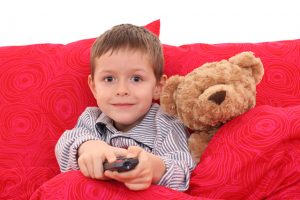Helping Children With ADHD and Autism Get Better Sleep is written by Star Newcomb and was originally published on www.thesleepjudge.com
If you have a child with ADHD or Autism or even both at the same time, you know the struggle is real when it comes to sleeping habits. I completely understand how you feel and it’s not because I’ve been reading about it, it’s because I’m a mom of a son who is diagnosed with both. He has severe ADHD and falls in on the spectrum. It’s been a difficult journey so far with sleep and regulating those habits, but no need to worry, there are some options if you are having a tough time.
Disclaimer: This article is not meant to diagnose or treat those with ADHD or Autism. This is just for informative purposes only and to help them better their sleep habits.
My Story
Before I get into all the scientific mumbo jumbo, I want to give you a little insight about my son. His name is Bruce, I call him B for short, and he’s 8 right now. When he was 6, he was diagnosed with ADHD and Autism. What led me to bring him to the doctor was that he was incredibly hyperactive, he couldn’t focus, he wasn’t sleeping, he wasn’t eating right, and he was starting to have aggression issues. I called my doctor and made an appointment and she then referred me to a behavioral specialist.
I took B to the specialist and they did some tests on him over a course of some time. They came back with the ADHD and Autism diagnosis. Back just a few years ago, they had certain Autism diagnoses’. You either had autistic disorder, childhood disintegrative disorder, pervasive developmental disorder-not other specified, and Asperger’s, which was just about as bad as you could get. Today, it’s just called the spectrum. My son falls on the spectrum, somewhere in the mild area, but dealing with it is just as difficult as if he were to be in the severe area.
School is struggle for him every day. Currently, he takes Adderall for his ADHD. Unfortunately, there isn’t much he can take because he has a heart defect that interferes with certain medications. He was born with Tetralogy Of Fallot. It only occurs in about 5 out of every 10,000 babies. He has undergone 3 open heart surgeries and his doctors say that because of this, it is where his disorders came from. Anyway, due to this, there are only certain medications he can take, so treating these conditions are quite limited, which means helping him get to sleep is limited.
B doesn’t sleep and when he doesn’t sleep, his ADHD and Autism seem to get worse. He will binge eat, his aggression will get out of hand, he will beat me until I have bruises, he will beat up his siblings, punch holes in my walls, and he will break anything that he can get his hands on. I have tried almost everything to get him to settle down, but I have been unsuccessful, which is what led me to research different ways that most people wouldn’t think of. So, if you are having the same issues as me or want to prevent these issues from happening, keep reading.
What Causes Sleep Disorders

Children who have ADHD and Autism tend to suffer from sleep disorders for a number of theoretical reasons. I say theoretical because researchers aren’t completely sure as to why this happens. The first theory is based on social cues. Most “normal” people see the light turn to dark and they know it’s time to go to sleep because of our circadian rhythm. Most children may also see their siblings going to bed and know that it is their turn. Children who have autism, who also may have difficulty communicating, may have an issue understanding this cue or may fail to understand this cue altogether.
Another theory between autism and sleeping has to do with melatonin. This naturally occurring hormone helps regulate sleep-wake cycles. In order to make melatonin, your body needs an amino acid called tryptophan. In kids with autism, these levels are either higher or lower than normal. Studies have shown that in some children, they don’t release melatonin at the correct times of the day. Rather, they have higher levels during the day and lower levels at night.
Kids with ADHD have a lot more issues going on when it comes to sleeping. They have trouble with self-regulation. This can keep them from going from active mode to wind-down mode when it comes time for bed, they can’t stop thinking about things even when they are trying to sleep, and they experience restlessness that disturbs them or wakes them up.
The Effects Of Sleep Problems
The effects of sleep problems can vary. As I said before, when my son doesn’t sleep, he gets aggressive. Here are some things to look out for when your child isn’t sleeping:
- Aggression
- Depression
- Hyperactivity
- Irritability
- Low cognitive performance
- Poor learning
- Increased behavioral problems
Getting Them To Sleep
When a child has ADHD or Autism, it may be difficult to get them to sleep right. When they have both, it’s even worse, trust me on this one. A British research study showed that three times as many children with ADHD have a tough time falling asleep or staying asleep and 57% of their parents got less than 6 hours of sleep. More than half of these kids were up four times in the middle of the night and almost half of them were up before 6.00 a.m. Sounds exhausting, doesn’t it? It is. I don’t get much sleep because usually when my son is up in the middle of the night, he’s binge eating or trying obsessively looking for random things such as electronics or toys.
Getting them to sleep through the night may be tough when it comes down to it. Luckily, I did some digging and found quite a few ways that you can get your child to sleep without medicating them, because over-medicating your child just isn’t beneficial and it could even be considered abusive. So, here’s how you can get your child to sleep without medication.
#1. Eat & Drink Right

Eating and drinking properly before bed can really help your child sleep throughout the night. Digestion can keep your child awake. If they insist on snacking, like my son constantly does, give them warm milk, cold turkey, or some saltines. These things have a chemical called tryptophan, which is a natural sleep-inducing chemical. There are plenty of other sleep-inducing foods and drinks that you can give your child before bed as well.
Your child also be drinking enough water during the day to prevent them from asking for a glass of water at bedtime, which will lead to a bathroom break later on. My son is notorious for this. He will ask for whatever drink he can get just so he doesn’t have to stay in bed and he will do it multiple times. He then has to get up over and over again to use the bathroom.
#2. Get Plenty Of Exercise

Exercising is an important part of your child’s bedtime routine. You can have them jump rope, jog, ride a bike, walk, or even just send them outside to run around for a little while. When my son is getting too out of hand or wild, I send him outside to run off some of his energy. Physical activity helps our body transition between the phases of sleep. It also places stress on the body and increases the time a child spends in a deep sleep. I try to send my son out 2 hours before bedtime then I bring him in to take a warm shower, it seems to calm him right down. If you choose, you can also create an exercise routine for your child that includes easy things such as lunges, squats, burpees and other things to tire them out.
#3. Get Rid Of Night-time Distractions
If a child has ADHD and Autism, distractions are a huge deal. B is distracted by literally everything and he becomes obsessive over it. He has an iPod that he listens to, but if it isn’t charged, he wants something else and if I won’t give it to him, he will obsess about a tablet or old cell phone and then he becomes manic. If your child isn’t that bad and just gets distracted by small things such as a clock light, you can try to find one that only lights up when a button is pressed because even the smallest light can be disruptive.
Door Lights

Believe it or not, the smallest amount of light can be distracting to a child with such disorders. It’s best to turn their bed away from the bedroom door so that they aren’t disturbed by the light coming through it. If it isn’t possible, try putting a rolled up towel on the outside of the door so that they can’t see the light coming under it.
Window Lights

Here’s something that I’m having an issue with right now since the days are getting longer-lights coming in the windows at 8:30 p.m. My son sees this and doesn’t think it’s time for bed. The best way to approach this is to get some blackout curtains. These will reduce as much light as possible and trick their mind into thinking it’s actually dark outside. If this doesn’t work, consider a sleep mask.
Earplugs & Relaxing Music

If they are distracted by noises such as TV chatter, phone noises, dogs barking, or other small noises that they can’t control, let them use earplugs or listen to relaxing music. My son loves to listen to music when he’s trying to sleep, he says it relaxes him.
#4. Create A Healthy Bedtime Routine
I know it seems like a tough thing to do, I’ve failed many times, but it can be done. Rituals that are done close to the evening can signal the brain and body that it is time to slow down. It can also provide a closeness with the caregiver that is comfortable, allowing those fearful children to sink into a peaceful sleep. Keep in mind, they will still need time to get their homework done, so give them at least an hour before bedtime to do so before having their slowdown time with you.
Tell Stories

Storytime is very popular in my house. I have to read to four children on a nightly basis usually. My girls want their stories and my boys want theirs. Since my son has a reading deficit, I have to read for him. He loves when I sit on the edge of his bed and read him a chapter or two a night from one of his favorite books. This is a great bonding time and it helps to get him settled in for the night.
Give Them Their Favorite Item

Does your child have a favorite stuffed animal, blanket, or toy? My son changes the item he cherishes on a weekly basis. One week it’s his stuffed turtle, the next, it’s his stuffed puppy. No matter what it is, I make sure he has it because it’s his comfort piece, no matter how silly it may seem.
#5. Dress Them Comfortably

If your child has sensitivities to certain clothing due to sensory issues, you are going to want to pay close attention to this. Make sure you are dressing them in something that they are going to enjoy sleeping in. If they don’t like the way fleece feels on their legs, dress them in those track pants or something cotton-y. If they don’t like sleeves, dress them in something without sleeves or vice versa. It’s just a matter of figuring out what your child is most comfortable sleeping in. My son does not like to sleep in pajamas, he would rather sleep in his jeans-strange, I know.
Keep Them Cool
If the room is too hot, your child might not be comfortable. My son doesn’t like to be cold, so this doesn’t really apply to him. But if they are hot, dress them in moisture wicking clothing or cotton sleepwear. This will prevent them from sweating. You can put a fan or an air conditioner mixed with a dehumidifier in their room to keep it at a cool temperature and not so humid.
#6. Help Them Relax

“B, relax!” It’s a phrase I say all of the time. I know you probably say it to your child too. It may seem out of reach for them to actually do it, but there are ways to help achieve this. You can start by giving them a foot rub, especially if they are very restless. You can also have them focus on their breathing by having them focus on an elevator going up and down. You can also encourage prayer if you are into that sort of thing as well. All of these can help them relax and ease their minds.
#7. Cut The Electronics

In my house I shut the electronics off 2 hours before bedtime. This gives my son more than enough time to settle down. Kids with autism generally enjoy the touchscreen interactions, so this might be hard, but it’s necessary. Electronics are stimulating to children, so if you take them away, they won’t be as stimulated. You can try more calming activities such as reading, board games to help them fall asleep, listening to music, but it should all be limited.
#8. Ask About Their Medication

If your child takes medication for their ADHD or Autism related disorders, ask your doctor about the stimulation it causes. If your child is having sleep related issues, it may be from the medication. My son was having a lot of issues because of the dose of Adderall he was taking. We changed it up and his sleeping improved. Most ADHD medication is some kind of stimulant, which can keep them awake, so just make sure you are monitoring that closely. Your doctor may want to try a medication called Clonidine, but just to warn you, it is said that many kids who take it do fall asleep easier, but they wake up in the middle of the night. They have suggested that my son take it, but we haven’t reached that step yet.
#9. Avoid Caffeine And Fat

This is probably really obvious, but avoid giving your child caffeine before bedtime. This includes drinks, food, and snacks such as chocolate. Caffeine is a stimulant and will have pretty much the same effects as screen time will. It will also make your child have to use the bathroom more in the middle of the night. This can be considered as the ultimate stimulant and can keep them awake for hours. Before you give your child anything before bed, look at the caffeine content on the package.
Fats
Another thing you should look at is the fat content. This is something that should be limited in our diets as well. It isn’t good for us in large quantities and can lead to type 2 diabetes, heart disease, and issues with weight. This takes longer to process in the digestive system than other foods and can keep a child awake longer if eaten close to bedtime.

#10. Keep Strict Rules

If your child absolutely refuses to go to bed like mine does, just stick to your guns. Some children with ADHD and Autism will do anything to avoid going to sleep. This is when you need to try a behavioral approach. You need to give your child strict orders for them to stay in bed between certain hours. You can sit outside of their door and calmly tuck them back into their bed if they get up. After a few nights of doing this, you may no longer have to sit outside of their door. You shouldn’t try this unless you have the patience to follow through with it. If you let your child break these rules, they’ve won.
Strict Bedtime
Another thing that you should try to do is set a strict bedtime and stick to it. I set a time of 8:00 p.m. for my son and I always make sure he is in his bed by that specific time, or at least in his room. He puts up a heck of a fight, but I don’t let him win.

Conclusion
It’s tough having a child with ADHD or Autism or both, I know. It can be tough enforcing the rules or trying to manage their sleeping habits. My son gives me an issue every night, but I fight through it and get him in his bed. He might not fall asleep right away, but eventually he drifts off. There are plenty of ADHD help guides around that can help you with questions you may have, but one major one that a lot of parents have is related to sleeping. Hang in there, you’ll get it. Take some deep breaths, try not to get frustrated, and talk to your child’s doctor if anything concerns you that may seem out of the ordinary.
Article originally posted on www.thesleepjudge.com



